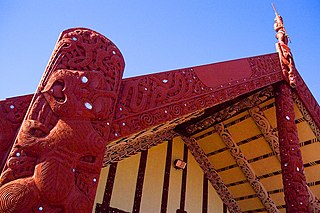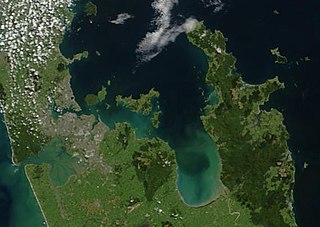
Māori culture is the customs, cultural practices, and beliefs of the indigenous Māori people of New Zealand. It originated from, and is still part of, Eastern Polynesian culture. Māori culture forms a distinctive part of New Zealand culture and, due to a large diaspora and the incorporation of Māori motifs into popular culture, it is found throughout the world. Within Māoridom, and to a lesser extent throughout New Zealand as a whole, the word Māoritanga is often used as an approximate synonym for Māori culture, the Māori-language suffix -tanga being roughly equivalent to the qualitative noun-ending -ness in English. Māoritanga has also been translated as "[a] Māori way of life." The term kaupapa, meaning the guiding beliefs and principles which act as a base or foundation for behaviour, is also widely used to refer to Māori cultural values.

Whakapapa, or genealogy, is a fundamental principle in Māori culture. Reciting one's whakapapa proclaims one's Māori identity, places oneself in a wider context, and links oneself to land and tribal groupings and the mana of those.
Whānau is the Māori language word for the basic extended family group. Within Māori society the whānau encompasses three or four generations and forms the political unit below the levels of hapū (subtribe), iwi and waka. These steps are emphasised in Māori genealogy as a person's whakapapa.
In Māori and New Zealand English, a hapū functions as "the basic political unit within Māori society". A Māori person can belong to or have links to many hapū. Historically, each hapū had its own chief and normally operated independently of its iwi (tribe).

Te Whānau-ā-Apanui is a Māori iwi located in the eastern Bay of Plenty and East Coast regions of New Zealand's North Island. In 2006, the iwi registered 11,808 members, representing 13 hapū.

Te Aitanga-a-Hauiti is a Māori iwi (tribe) on the East Coast of New Zealand's North Island. Its rohe covers the area from Tawhiti-a-Paoa Tokomaru Bay to Te Toka-a-Taiau Gisborne on the East Coast of the North Island of New Zealand.
Ngāriki Kaipūtahi, Ngāriki Kaiputahi or Te Iwi o Ngāriki Kaipūtahi is a Māori iwi (tribe) in the Mangatu area of Gisborne District, New Zealand. Its present-day members are all descended from Rawiri Tamanui.

Ngāti Pāoa is a Māori iwi (tribe) that has extensive links to the Hauraki and Waikato tribes of New Zealand. Its traditional lands stretch from the western side of the Hauraki Plains to Auckland. They also settled on Hauraki Gulf islands such as Waiheke.
Ngāti Rangitihi is a Māori iwi of New Zealand, located in the Bay of Plenty.
Ngāti Whare is a Māori iwi of New Zealand. It is part of a group of tribes participating in the "treelords" Treaty of Waitangi settlement with the New Zealand government involving Central North Island forestry land and cash.
Rongowhakaata is a Māori iwi of the Gisborne region of New Zealand.

Te Uri-o-Hau is a Māori iwi (tribe) based around New Zealand's Kaipara Harbour. It is both an independent iwi and a hapū (sub-tribe) of the larger Ngāti Whātua iwi, alongside Ngāti Whātua-o-Ōrākei, Te Roroa and Te Taoū. Its rohe includes Dargaville, Maungaturoto, Mangawhai, Kaiwaka and Wellsford.
Ngāti Tarāwhai is a Māori iwi of the Rotorua area of New Zealand, and a member of the Te Arawa confederation of tribes. The iwi's rohe covers the western shore of Lake Ōkataina.
Rereahu was a Maori rangatira (chieftain) of Ngāti Raukawa in the Tainui tribal confederation from the Waikato region, New Zealand. He probably lived in the first half of the seventeenth century. He is the ancestor of the Ngāti Maniapoto, Ngāti Hauā, and Ngāti Korokī Kahukura iwi, and of Rereahu, a group based around Maniaiti / Benneydale, Pureora, and Maraeroa in Waitomo District, whose status as a separate iwi or as a hapu (‘sub-tribe’) of Ngāti Maniapoto is a matter of dispute.

Te Ākitai Waiohua is a Māori iwi of the southern part of the Auckland Region of New Zealand.

Ngāti Kahu ki Whangaroa are a Maori iwi (tribe) based at the Whangaroa Harbour harbour area in New Zealand's Northland Region.

Urban Māori are Māori people living in urban areas outside the rohe of their iwi (tribe) or hapū (sub-tribe). The 2013 New Zealand census showed that 84% of Māori in New Zealand lived in urban areas, 25% lived in Auckland, and most others lived in other metropolitan centres like Wellington and Christchurch. Many Māori continued to associate with their iwi and their rohe, but more than 15% did not know their tribal affiliation.

Elizabeth Anne Kerekere is a New Zealand politician and LGBTQ activist and scholar. She was elected a member of parliament for the Green Party in 2020, but resigned from the Greens on 5 May 2023, following allegations of bullying within the party. Kerekere remained in parliament as an independent until the 2023 election.
Te Ūpokorehe is a Māori tribal group located in the eastern Bay of Plenty region of New Zealand. There is currently a dispute over whether it is a hapū (sub-tribe) of Whakatōhea or an iwi (tribe) in its own right.

Hāwai is a coastal settlement in the Ōpōtiki District and Bay of Plenty Region of New Zealand's North Island.











